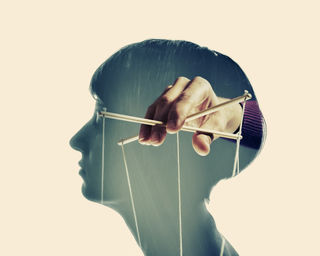Bias
10 Signs of Internalized Sexism and Gaslighting
Ten signs of internalized sexism in relationships and society.
Posted May 17, 2020 Reviewed by Jessica Schrader

"Boys don’t like it if you’re too smart."
—Mother to daughter about taking calculus class, from Stand & Deliver.
“The chubby girl? I think there’s a pretty sizable ass there, yes, sir. Huge thighs.”
—Female professional “trashing” a co-worker in front of her male boss, from Love Actually.
“I lived in a household where women were routinely treated as second class. For a long time, I bought into the negative stereotype and would make sexist and racist remarks about myself and other women. Only after I moved out did I realize that I had been bamboozled.”
—Anonymous
Internalized sexism can be defined as the tendency of some women to regularly put down, make disparaging remarks about, and/or sabotage their own or other women’s and girls’ identity, potential, and success.
Often, those with internalized sexism are consciously or unconsciously socialized into believing that women are inferior and “the weaker sex," and should either indiscriminately please, or “take a backseat” in their relationships with men (especially the dominant male figures in their lives). Significantly, one of the most common expressions of internalized sexism is when some women routinely attack (“trash”) other women and girls to marginalize their selfhood and power.
It is important to emphasize that many women with degrees of internalized sexism may not be consciously aware of their own disempowering words and actions (both toward themselves and other women). Many grew up around, are conditioned by, and have bought into the gender stereotypes and inequalities of family, society, institutions, religion, popular media, social media, and mass advertising. Some women even feel compelled to justify and defend gender inequalities. It is a classic example of gaslighting, where a perpetrator (in this case a gender-unequal society) convinces the victim that she is less than who she really is. The victim in turn gaslights oneself and other girls and women. Internalized sexism is a form of social and psychological brainwashing.
What are some of the most common signs of internalized sexism? Below are 10 characteristics, with references from my books, How to Let Go of Negative Thoughts and Emotions and Are You Highly Sensitive? How to Gain Immunity, Peace, and Self-Mastery!.
Some women may occasionally dabble in the following behaviors, which may not be a major issue. A woman with strongly internalized sexism will routinely engage in one or more of the pathologies (dysfunctions) below while remaining largely unaware of (or unconcerned with) the tangible and psychological damage done to oneself and other women and girls.
1. Regularly making disparaging remarks about one’s own body and physical appearance.
“When I wake-up every morning, I hate looking in the mirror and seeing all my body flaws.”
—Anonymous woman
2. Regularly making disparaging remarks about other women’s and girls’ body and physical appearance (body shaming).
"If what I wear is comfortable, I am not a woman. If I shed the layers, I am a slut."
—Billie Eilish
3. Constantly engaging in negative social comparisons with other women and girls. Routinely viewing other women as competitors in social and family situations, especially for the attention and approval of men.
“I dyed my hair blond and enlarged my breasts to get men’s attention – and to make other women jealous!”
—Anonymous
“How dare that woman take my son away from me. Who does she think she is?”
—Anonymous
4. Routinely viewing other women as competitors/adversaries in professional situations, especially those who show great potential and promise, and/or those in highly visible leadership positions.
“At my work, women negatively gossip far more about female colleagues than about males.”
—Anonymous
5. Making self-deprecating jokes/remarks based on negative gender stereotypes (i.e., “I’m a woman, so I’m bad in math.”)
6. Making deprecating jokes/remarks about other women and girls based on negative gender stereotypes (i.e., “There goes another clueless female driver!”)
7. Actively discouraging other women and girls from realizing their dreams and fulfilling their higher potential. (Deep down, those making such remarks may be jealous of other women doing what they themselves cannot.)
“I pleaded with my mother on the phone for the lab fee of my college science class. She finally agreed to pay, but only after saying that it was a waste of money on me.”
—Anonymous former college student, now a high-tech professional
8. Applying a double standard favoring men and boys over women and girls (i.e., in child-raising, family relations, student treatment in school, employee treatment at the workplace, customer treatment in business, etc.)
9 Defending, justifying, and excusing individual acts of misogyny, mistreatment, and/or abuse, either toward oneself or toward other women (learned helplessness).
“She deserved to be groped the way she was dressed.”
—Anonymous woman
“It was my fault [that my husband beat me].”
—From The Godfather
10. Defending, justifying, and supporting societal, institutional, political, and/or cultural bias and oppression against women (internalized oppression). Blaming women for causing their own victimization.
"Humans don’t like injustice, and when they cannot easily fix it, they often engage in mental gymnastics to make the injustice more palatable. Blaming victims for their suffering is a classic example."
—Grainne Fitzsimons, Aaron Kay, Jae Yun Kim
For tips on how to handle internalized sexism related stress, whether from oneself or from others, see references below.
© 2020 by Preston C. Ni. All rights reserved worldwide. Copyright violation may subject the violator to legal prosecution.
References
Ni, Preston. How to Let Go of Negative Thoughts and Emotions. PNCC. (2014)
Ni, Preston. Are You Highly Sensitive? How to Gain Immunity, Peace, and Self-Mastery!. PNCC. (2017)
Ni, Preston. How to Successfully Handle Gaslighters and Stop Psychological Bullying. PNCC. (2017)
Ni, Preston. How to Communicate Effectively and Handle Difficult People — 2nd Edition. PNCC. (2006)
Ni, Preston. How to Reduce Anxiety & Increase Certainty in Difficult Situations – A Practical Guide. PNCC. (2016)
Billie Eilish Tackles Body Shaming as Her World Tour Kicks off in Miami. BBC News. (March 10, 2020)
Fitzsimons, Grainne; Kay, Aaron; Kim, Jae Yun. “Lean In” Messages and the Illusion of Control. Harvard Business Review. (July 30, 2018)




